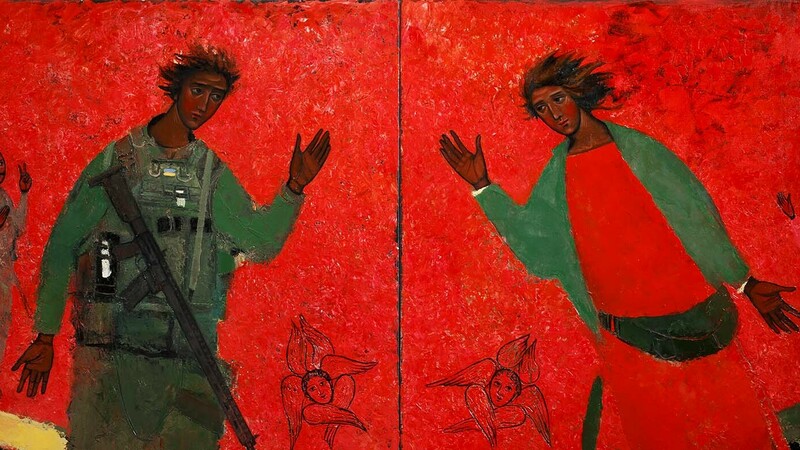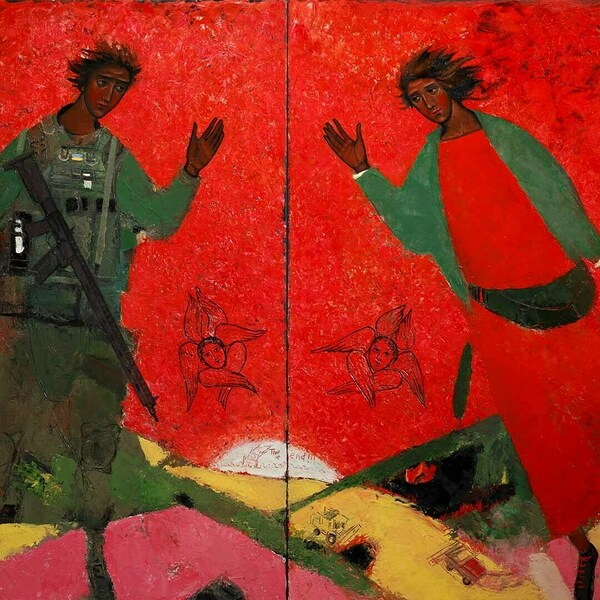
The First Letter to the Corinthians
Artur Dron
Love is patient. Love is kind.
It is not jealous, is not pompous.
Love is terrified like a beast
but it perseveres.
Love could give up and abandon it all
but it perseveres
Sometimes, love has gunshot wounds to
its legs or bullet fragments lodged in
them.
Tourniquets squeeze love’s legs,
or it has no legs anymore.
Then love’s friends carry love.
Love digs trenches and lives in them.
It gnaws ice from the bottle cut in half
when it gets thirsty at negative four.
Love takes up combat duty,
gets into position
with hernias, fevers, prostatitis,
with blast injuries,
asthmas and allergies,
with a high probability
of not making it back,
with thoughts about
the most significant one.
It bears all things, believes all things,
hopes all things, endures all things!
Love can distinguish by ear
the shots of rocket launchers,
the strikes of mortar shells, and
the movement of tanks.
Love’s eyes hurt when it stares into the
thermal imager for too long.
Love wakes up at night
when the mice in the dugout crawl
under its field coat.
Sometimes, love vomits long in the
trees after heavy combat.
Every now and then, it closes the eyes of
its friends.
Love wraps them up in sleeping bags
and carries them away.
Love never fails!
But where there are prophecies, they
will cease;
where there are tongues, they will
be stilled;
where there is knowledge, it will pass
away.
For sometimes, the shelling is over,
and friends close Love’s eyes,
wrap it up in a sleeping bag,
and carry it away.
And then it passes to the living.
Любов довготерпить, любов милосердствує,
не заздрить, любов не величається,
любов боїться тваринним страхом,
але продовжує йти,
любов могла б здатися, залишити все,
але продовжує йти.
А інколи в любові прострелені ноги,
або в ногах у любові осколки,
і ноги її стискають турнікети,
або ніг у любові більше немає.
Тоді любов несуть її друзі.
Любов риє окопи і живе в них,
і гризе у них лід із розрізаної пляшки,
коли хоче пити у мінус двадцять.
Любов виходить на бойові чергування,
піднімається на позиції
з грижами, з температурами, із простатитами, із контузіями,
з астмами і алергіями,
з високою імовірністю
не повернутися,
з думками про когось
найважливішого.
Все зносить, вірить у все,
сподівається всього, все терпить!
Любов розрізняє на слух
виходи градів, прильоти мін і рух танків.
Очі любові болять,
коли довго дивиться в тепловізор.
Прокидається любов
уночі, коли миші в бліндажі заповзають
під її бушлат.
Інколи любов
довго блює у посадці після важкого бою.
А інколи
любов закриває очі друзям своїм.
І загортає їх в спальники
і виносить.
Ніколи любов не перестає!
Хоч пророцтва й існують, та припиняться,
хоч мови існують, замовкнуть,
хоч існує знання, та скасується.
Бо інколи закінчується обстріл,
і любові закривають очі,
і друзі загортають її в спальники,
і виносять.
І тоді вона
переходить живим.
Analysis by Lindsay Burgess, with Andriana Opryshko

Arthur Dron is a 22-year-old graduate student of journalism at Ivan Franko National University of Lviv. In 2020, Dron published his first collection of poetry, Dormitory №6, which has been translated into Lithuanian, English, Polish, Italian, and Belarusian. However, now, instead of visiting lectures and receiving awards for his work, he is protecting Ukraine on the battlefield and writing poems about the experience of war. Despite the gentle quietness of his poems, Dron’s voice is loud in the sphere of modern Ukrainian poetry both in Ukraine and abroad.
Dron wrote “Перше до коринтян” (“The First Letter to the Corinthians”) in 2023 as a response to his experiences as a combatant in Ukraine’s armed forces. This poem will be featured in his upcoming collection of poetry We Were Here, which will include the poems he wrote during Russia’s full-scale invasion of his homeland. The poems in this book are Dron’s attempt to feature the voices of people who can no longer speak for themselves, to keep alive their dreams and memories, and their hopes for peace and freedom for Ukraine.
The poem pulls three direct quotations from 1 Corinthians 13, a Bible chapter that is frequently used in wedding ceremonies. However, the context and message of this chapter are not primarily about romantic love between two people. Instead, it provides a fuller insight into the life of an early Christian community and the strengths and weaknesses of this small group. In his letter to the Corinthians, Saint Paul explains that the root problem of this community is a lack of love and emphasizes the necessity, character, and permanence of love. Dron chooses each of the three verses from 1 Corinthians 13 in his poem to reveal how these aspects of love are altered and take on new meaning in times of war.
Dron’s poetic voice adopts the perspective of the Ukrainian soldiers on the front lines. Often in such poetry, soldiers would be depicted as unbreakable heroes fighting for the idea of a strong independent nation. Dron takes a different approach by personifying love and giving it traits of the soldier. The figure of the soldier here is not glamorized. Their life is as fragile as anybody else’s; they feel real human emotions. Dron’s Love is humane, compassionate, scared, wounded, and grieving.
Dron makes a connection between the love described in 1 Corinthians 13 and his experience as a young soldier on the front lines. He reveals how the kind of love described by Saint Paul can be used to personify and represent every person who is putting themselves forward to fight for Ukraine. Dron develops the idea of love for Ukraine through vivid imagery describing the senses he feels, hears, and sees while he is on the front lines. Love is personified in the image of a Ukrainian soldier and characterized in a multitude of ways, including having “gunshot wounds” or “bullet fragments lodged in them” and the gruesome, visceral, and sensory imagery of mice crawling “under [love’s] field coat” and love “vomit[ing] long in the trees.” Atypically, this “love” is not beautiful and harmonious. Dron uses this imagery to explain that often in wartime, love must adapt and be unconventional, but also demonstrates that, battered by the brutality of war, love is unconditional.
Although trauma is not the poem’s main point, Dron depicts some physical injuries describing how “tourniquets squeeze love’s legs, or it has no legs anymore.” These mental and physical traumas will have to be addressed after the war through a long process of rehabilitation. According to the Ministry of Veteran Affairs, more than 800,000 veterans in Ukraine will need to return to civilian life. Love, as depicted in Dron’s poem, is one of the possible answers to the challenges of the adaptation process for veterans. Love not only helps on the battlefield, reminding soldiers of the reason they are fighting, but it is also the bond connecting the soldiers with “the most significant ones,” their loved ones who will accompany them through their post-war rehabilitation.
Dron’s upcoming collection We Were Here will feature poems sharing the stories of people he knows or knew. One of his main goals is to preserve their memory, to bear witness to their existence. “The First Letter to the Corinthians” is also about social memory, remembering, and honoring the dead. At the end of the poem, the figure of Love “passes to the living” from the soldier who dies on the battlefield. This alludes to the memory that lives in the writings, songs, and testimonies of those who knew them.
Research by: Andriana Opryshko and Lindsay Burgess
Poet: Artur Dron
Translator: Hanna Leliv
Theme: Language of Hate and Love
Theme Introduction Next Exhibit
"The First Letter to the Corinthians" by Artur Dron, translated by Hanna Leliv, reproduced with permission.
Header image: “The Day of Our Victory” by Kateryna Kosianenko, oil on canvas, 2022. Image used with permission from Kateryna Kosianenko.